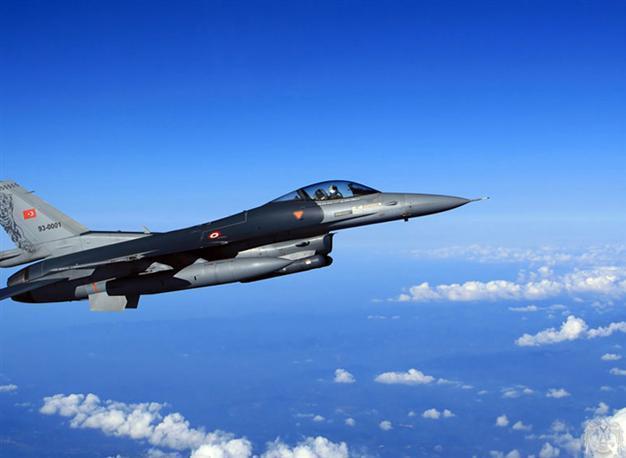Turkish airstrikes target ISIL in Syria
ANKARA

File photo: The Turkish Air Force
Turkey carried out airstrikes against three Islamic State of Iraq and the Levant (ISIL) targets in Syria for 13 minutes early July 24.Three Turkish F-16 fighter jets took off from the 8th Main Jet Base in the southeastern province of Diyarbakır at 3:12 a.m. and hit two ISIL headquarters and one rallying point inside Syria with guided missiles from 3:40 a.m. to 3:53 a.m., Turkish Prime Minister's Office said in a statement.
The operation was named after Yalçın Nane, a non-commissioned military officer who was killed during Turkish army's first gunfight with ISIL on the border in the province of Kilis on July 23.
Ankara informed its allies before the military operation on early July 24 that hit ISIL targets, a Turkish official told the Hürriyet Daily News.
Private broadcaster CNNTürk reported that the Turkish jets launched their missiles from Turkey, without entering the Syrian airspace.
The decision was taken at a special security meeting in Ankara late July 23, hours after the clash on the border.
"The state of the Republic of Turkey is decisive in taking any precaution to safeguard its national security," the official statement confirming the airstrikes said on July 24, adding that the Turkish F-16s returned to their bases at 4:24 a.m.
Suicide bombing triggers more violence
The Turkish Armed Forces (TSK) had announced that five armed terrorists opened fire at a military outpost on Syrian border on July 23 and killed one non-commissioner officer, while wounding two troops. As a result of Turkish retaliation, one ISIL militant was killed and three ISIL vehicles were hit.
Hours before the July 23 border clash which involved four Turkish tanks, Turkey agreed to open its İncirlik military base to aircraft of the anti-ISIL coalition.
The new joint action consensus between Turkey and the United States also covers a partial no-fly zone over the Turkey-Syria border.
The 90-kilometer line between Syria’s Mare and Cerablus will be 40 to 50 kilometers deep, sources told daily Hürriyet, while elaborating on the security steps outlined by Deputy Prime Minister Bülent Arınç, following a cabinet meeting on July 22.
Turkey also recently decided to beef up security on its borders with Syria by flying surveillance balloons and building a two-fenced border system with a new moat.
On July 20, 32 people were killed by a suicide bombing in a Turkish town on the Syrian border that the government blamed on ISIL.
This sparked an upsurge in violence in Turkey’s Kurdish-dominated southeast, where many accuse the Turkish authorities of collaborating with ISIL, accusations Ankara denies.
Turkish police on July 24 launched raids to arrest suspected members of ISIL and other militant groups, including the outlawed Kurdistan Workers' Party (PKK), in an apparent bid to stamp down on all sources of violence, the state-run Anadolu Agency said.
















